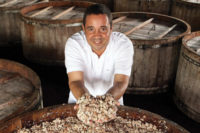At-a-Glance: Santa Helena
President: Renato Fechino
Headquarters: Ribeirão Preto; São Paulo, Brazil
Website: www.santahelena.com
Employees:1,450
Brands: Paçoquita, Santhel, Mendorato, Crokíssimo, Grelhaditos, Amindu’s, Troféu, Pé de Moleque Crokatto, Doce Tradição, Gibi, Gostinho da Fazenda and Santa Helena Zero.
The first thing you notice about the Santa Helena plant in Ribeirão Preto, Brazil is the amazing smell of fresh peanuts roasting.
The company processes 150 tons of peanuts per day, many of which find their way into Santa Helena’s most popular candy, Paçoquita — a treat made with just three ingredients: roasted grounded peanuts, pure cane sugar and salt.
Founded in 1942, Santa Helena started in a home kitchen.
Today the company has two manufacturing facilities. One, which is mostly used for storing peanuts, is surrounded by peanut plantations that serve as the company’s suppliers. About 150 employees keep that plant up and running.
The other facility is used to process all the peanuts and make all the different products. There, about 1,300 employees work to constantly churn out Paçoquita and other items.
The company created the popular peanut candy treat in 1987, and now it’s the most well-known peanut candy Brazil, and the market leader in the category.
Although Brazilians love to eat it year round, it’s most popular during the South American winter months, when the country is celebrating its June Festivities.
Aside from its traditional package, which is a wrapper around a single serving, it also comes in a chewy format, in a jar, and in a sugar-free version.
To make Paçoquita, first they harvest the peanuts, then the raw peanut is roasted. After that they let them cool and then remove the peel. Then, the sugar and the salt are added and all three are mixed together.
If it’s bound for the typical individual serving sizes, it’s then pressed into its shape and wrapped. And in fact, the press machine is one of several pieces of equipment developed at Santa Helena for Santa Helena.
Of course, what would a peanut company be without peanut snacks? Santa Helena also makes a variety of other brands, including Mendorato a, “golden Japanese peanut” that’s incredibly popular in Brazil. And a line of snacks under the brand Santhel that’s export only. It features eight peanut flavors, six of which are salty and two of which are sweet.
The company also has excelled at creating sugar-free products, such as it Paçoquita Zero, and a line called Santa Helena Zero.
Santa Helena is proud to say that it meets international quality standards down to the smallest detail — everyone is required to wash their hands every time they enter a new section of the plant. And indeed, the main plant is incredibly clean. The staff says it also cleans the peanut roaster one a week, and they analyze every package of product for quality control, including scanning everything through a metal detector.
Since Santa Helena processes peanuts, they also have to constantly analyze the product to make sure the Brazilian humidity hasn’t created the peanut toxin known as aflatoxin.
All those quality control measures come in handy, as the company looks to the global market.
The company is now looking to do more exporting and Santa Helena’s newest item is a Paçoquita Gift Box specifically designed to appeal to consumers outside of Brazil who may have never tried it before. Aside from 16 individual pieces of Paçoquita it also includes a book, “Discover why every Brazilian loves Paçoquita.” Featuring both English and Spanish, it details eight different ways to enjoy the candy, such as adding it to a smoothie or sprinkling it on top of sliced bananas and melted chocolate.
The product was a hit at the 2014 ISM in Germany.
Mirella Figueiredo, the company’s export manager, says visitors to their stand were surprised to find traditional Brazilian sweets at Brazil’s Pavilion.
“We had a high number of visitors and closed with distributors in the important markets of Latin America,” says Figueiredo. “What surprised us was the interest of Arab buyers. Due to this interest, we will anticipate… launching our products in the Arab market”.
In the book featured with each gift box the company explains its desire to share its signature treat with the world.
“Paçoquita is a part of our culture and it is consumed by people of all ages and all social layers,” it reads. “It is an expression of our way of life, being at the same time healthy and delicious, practical and convenient. It is a true passion of Brazilian people. That’s why we love and that’s why we share.”
Indeed, this delicious treat is long overdue for the world stage.

































